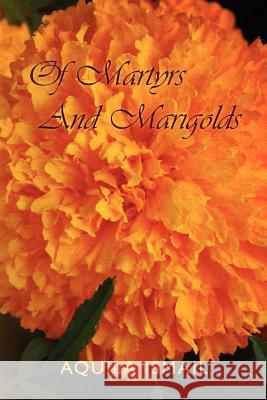Of Martyrs And Marigolds » książka
Of Martyrs And Marigolds
ISBN-13: 9781463694821 / Angielski / Miękka / 2012 / 306 str.
Extended Description Of Martyrs and Marigolds is the story of a young Pakistani woman, caught in the throes of revenge in the after birth of Bangladesh, the golden land, born after nine months gestation, with the Mother Goddess of India, Indira Gandhi, playing midwife. The protagonist, Suri, is born to parents who choose to migrate from India to the eastern wing of Pakistan, at the time of the great partition of 1947, when the British Empire finally dissolved its colony in the Indian Subcontinent. Suri, leads an idyllic life defined by the various cultural aspects of society in East Pakistan informed deeply by the Bengali language, the British colonial past and the Muslim social character of a country created in the name of Islam. She carries these hues within her and it is never a problem until she is caught up in the rapidly unfolding violence that accompanies the birth of Bangladesh. The narrative follows non-chronologically beginning on the 4th day of February in 1972, the day Suri is forced out of her house in Mirpur, an enclave in the suburbs of Dacca. Interwoven with the present is the family's past history with Suri's young parents setting up home and having children in the new land. Of Martyrs and Marigolds is also the story of the romance between Suri and Rumi which blossoms in Dacca University. The campus is the focal point of the liberation struggle and Rumi's cousin is one of the February 1952 martyrs, shot by policemen when protesting the imposition of Urdu over Bengali as the national language. When Suri ultimately becomes a victim of this division based on the spoken language, the intensity of their love tries to transcend the political facts of Bangladesh. Suri is deemed to not belong to the land of her birth and is placed in an internment camp for women, located in an abandoned mansion on the banks of one of the forty-four rivers that crisscross the golden land. Ultimately she has to choose between her family and her love for a man who belongs to the side that massacres and dispossesses her people. In parallel with Suri's story is that of her friend Haseena, whose parents are from Isfahan, Iran. She is discovered by Pakistani soldiers under the dead bodies of women in the seaport city of Chittagong in March 1971, following events that take place before the onset of the nine-month struggle for liberation. This proves that ethnic cleansing of Suri's people was not only due to their perceived support of the oppressors, but a consequence of the inherent adversarial internal dynamics between the people of the two wings of the country. The internal divisions are fanned by India which ultimately fights a war with Pakistan to deliver Bangladesh to the Bengalis. Evocative and elegant, Of Martyrs and Marigolds, is both historical drama and stunning romance. Ismail examines the horrors of ethnic cleansing of Biharis by the Bengalis as well as the fierce and indomitable courage of Bengalis, who refuse to be extinguished in the face of a marauding national army. Although a story of the massacre of Urdu-speaking people in East Pakistan/Bangladesh in 1971 and 1972, the novel brims with sympathy and compassion for the Bengalis who seek a country for themselves. This novel is both an important document of history and an engaging story you will never forget "A cry of despair and grief, Of Martyrs and Marigolds reveals a heretofore little examined piece of modern Islamic history and how one family struggled to survive oppression from their own people. Students of Asian history and those seeking to better understand Muslim culture will want to read this book, which converts a closely held family tragedy into a complex parable with subtle lessons about the danger of "isms." -Barbara Bamberger Scott (Clarion Foreword Review) http: //tribune.com.pk/story/340653/the-other-side-of-history/
Zawartość książki może nie spełniać oczekiwań – reklamacje nie obejmują treści, która mogła nie być redakcyjnie ani merytorycznie opracowana.











